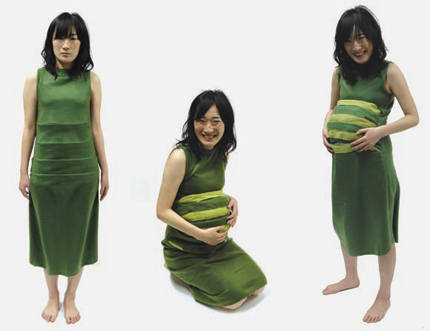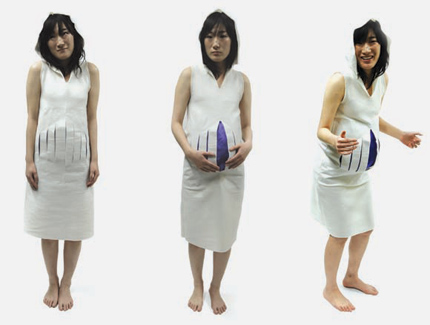
Rodríguez's Skin collection fits the body no matter how much it changes
Marisol Rodríguez first tried her hand at origami when she was an industrial-design student at Los Andes University, in her hometown of Bogota, Colombia. She took classes in Asian culture, and was fascinated by how the Japanese art of paper-folding could transform a perfectly flat material into — presto — something 3D. But fabric, not paper, interested her as an origami medium. In Skin, her limited-edition line of stylish, expandable clothing for pregnant women, she applies origami to organic cotton to break the hide-the-bulge mold of most maternity wear. “We want to highlight the belly,” says Rodríguez, now 29 and based in Brooklyn. “This is happiness that is showing through your clothes.”
Rodríguez started developing the collection while she was still living in Colombia, stirred when her brother’s wife was pregnant with the couple’s first child. Recognizing how little money most people in her native country have to spend on clothes, she conceived a design that would last throughout a woman’s pregnancy, minimizing what a mother-to-be would need to buy for herself. The concept got a favorable review in a local design magazine, and Rodríguez looked into mass-producing her line. But ultimately she decided that at that point in her life she “wanted to just keep designing and sketching,” rather than start up a business. She shelved the idea as she moved to the U.S. and began working for various firms doing market research, project management and design.
But the problems of her homeland, where her family still lives, plagued her. She was particularly troubled by high unemployment among women who are in their 50s — many of them fired from jobs despite their skills, but not yet eligible for retirement assistance, which begins at age 62. “What do you do when no one wants to hire you, and you still have to support your family and pay your rent?” Rodríguez asks.
Hoping to help this segment of the female population that has fallen through the cracks, the designer and her 63-year-old mother teamed up: they established a small workshop in Bogota that employs women in their 50s to hand-craft goods. Housed in a two-bedroom rental apartment, their Bogota Factory doubles as a showroom over which Rodríguez’s mother presides — people come in and see samples of clothing, knitwear and painted wood pieces, then place orders. Mother calls in workers on an as-needed basis (currently there are three women, paid an hourly wage), while daughter provides design and business expertise from afar.
Rodríguez started developing the collection while she was still living in Colombia, stirred when her brother’s wife was pregnant with the couple’s first child. Recognizing how little money most people in her native country have to spend on clothes, she conceived a design that would last throughout a woman’s pregnancy, minimizing what a mother-to-be would need to buy for herself. The concept got a favorable review in a local design magazine, and Rodríguez looked into mass-producing her line. But ultimately she decided that at that point in her life she “wanted to just keep designing and sketching,” rather than start up a business. She shelved the idea as she moved to the U.S. and began working for various firms doing market research, project management and design.
But the problems of her homeland, where her family still lives, plagued her. She was particularly troubled by high unemployment among women who are in their 50s — many of them fired from jobs despite their skills, but not yet eligible for retirement assistance, which begins at age 62. “What do you do when no one wants to hire you, and you still have to support your family and pay your rent?” Rodríguez asks.
Hoping to help this segment of the female population that has fallen through the cracks, the designer and her 63-year-old mother teamed up: they established a small workshop in Bogota that employs women in their 50s to hand-craft goods. Housed in a two-bedroom rental apartment, their Bogota Factory doubles as a showroom over which Rodríguez’s mother presides — people come in and see samples of clothing, knitwear and painted wood pieces, then place orders. Mother calls in workers on an as-needed basis (currently there are three women, paid an hourly wage), while daughter provides design and business expertise from afar.

Pleats can be vertical as well as horizontal
Rodríguez’s Skin maternity line is one of Bogota Factory’s first offerings. There are three different two-tone dress styles in the collection, with either vertical or horizontal pleating. In every case the brighter of the two colors is the one revealed as the wearer’s belly expands. The dresses are priced at 60,000 to 65,000 pesos each ($30 to $35 in U.S. currency). Sales of the dresses and other Bogota Factory items just about cover operating expenses, with Rodríguez, who currently works as a freelance design consultant, occasionally kicking in a bit of her own money when earnings come up a short.
The idea of expanding the business and exporting goods to Europe is tantalizing to Rodríguez, who is the first to admit that Bogota Factory’s small-scale, low-tech, labor-intensive operation is not the most efficient business model. Sending the fabric to a laser-cutting facility would certainly get the cotton cut faster, and with greater precision, than having a worker use a pair of scissors to execute the job by hand. Then again, the entire dress line could easily be produced overseas.
But for the designer and her mother, the aim is not to eliminate jobs locally, but rather to create them. They would like to be able to employ at least one more woman. Their immediate goal, however, is to offer their current workers a labor package that includes health insurance. Another sticky issue is whether to continue to use organic cotton — which Rodríguez prefers on environmental grounds, but costs 15 percent more than conventionally made fabric.
For now, mother and daughter are satisfied with the modest progress they’ve made. “Maybe later on, we can actually make an economic profit,” says Rodríguez. “But at this moment the ‘profit’ is just to be able to say that one more person who didn’t have a job yesterday is working today.”
The idea of expanding the business and exporting goods to Europe is tantalizing to Rodríguez, who is the first to admit that Bogota Factory’s small-scale, low-tech, labor-intensive operation is not the most efficient business model. Sending the fabric to a laser-cutting facility would certainly get the cotton cut faster, and with greater precision, than having a worker use a pair of scissors to execute the job by hand. Then again, the entire dress line could easily be produced overseas.
But for the designer and her mother, the aim is not to eliminate jobs locally, but rather to create them. They would like to be able to employ at least one more woman. Their immediate goal, however, is to offer their current workers a labor package that includes health insurance. Another sticky issue is whether to continue to use organic cotton — which Rodríguez prefers on environmental grounds, but costs 15 percent more than conventionally made fabric.
For now, mother and daughter are satisfied with the modest progress they’ve made. “Maybe later on, we can actually make an economic profit,” says Rodríguez. “But at this moment the ‘profit’ is just to be able to say that one more person who didn’t have a job yesterday is working today.”
